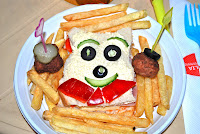Celebrating Thanksgiving in Bulgaria was excellent. In addition to the paper turkeys and decorations at the office, I had “Thanksgiving” themes for both of my adult English classes. In the beginner class, we played Bingo and ate pumpkin cookies with cream cheese frosting and I talked a bit about the holiday. In the advanced class, we read a short story about the first Thanksgiving, discussed what we’re thankful for, and unscrambled the lyrics to “What a Wonderful World.”
Then, I traveled to another volunteer’s site to help with her Thanksgiving Day project. Quite a few PCVs, plus some American missionaries, and an Austrian, helped with the festivities at the Internaht where she works. Then, we made an awesome dinner and ate, in keeping with tradition, until we could hardly move.
The experience at the Internaht was intense. An Internaht, aka Boarding school, is a specialized institution for minors who have committed antisocial acts and crimes. The kids were so excited to have us be there. In the morning the kids helped make pumpkin bread, bake cookies, and put together Native American headdresses. It was pretty incredible to see these ‘tough’ teenagers, eager to glue feathers on a hat or to put an apron and help in the kitchen.

After lunch, we showed a short presentation on America, the organizing volunteer had put together and went on a scavenger hunt around the village. Before the games could start, each kid had to write something they were grateful for on a paper leaf, which was then put on a large tree cut out in the main hall. I’m sure this is a common thing in schools and other such places around Thanksgiving, but here, in this setting, it was really something else. It was a perfect way to spend the holiday. At the end of the day we went back to host volunteer’s house, cooked, and ate until we could hardly move.
One task of the scavenger hunt was to have the kids give away some of the pumpkin bread they cooked to someone in the village. These kids don’t have much in the way of material things, so I imagine that the act of ‘giving’ isn’t something they frequently do. I don’t know about the other groups, but the group of kids I was with spent a while on this item. They ended up dividing the bread and walking all over town to give it away to a greater number of people. It was great.










































